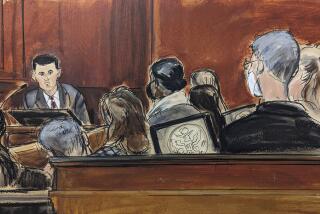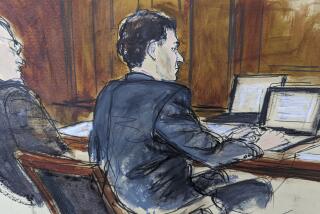Enron Auditors Warned About Accounting
- Share via
HOUSTON — An Arthur Andersen partner testified Wednesday that he was warned about Enron Corp.’s accounting methods by Enron Vice President Sherron S. Watkins, and that he relayed those concerns to his firm’s Enron team.
Andersen partner James Hecker told a federal jury here that he received the call from Watkins, a former colleague at Andersen, Aug. 20. Hecker said Watkins confided her increasing uncertainty over the propriety of Enron’s methods of accounting for off-the-books partnerships managed by her supervisor, Enron Chief Financial Officer Andrew S. Fastow.
Hecker was not involved with the Enron audit but said he relayed Watkins’ concerns to several Andersen partners in the Houston office who were.
Hecker, the first Andersen executive to testify in the trial, took the stand as prosecutors sought to prove that Andersen feared a Securities and Exchange Commission probe of Enron and shredded documents to obstruct the inquiry. A conviction on the obstruction charge could prompt the SEC to prohibit Andersen from auditing public companies, dealing a devastating blow to the 89-year-old firm.
Under questioning from prosecutors, Hecker said he had long harbored concerns about the “innovative” accounting techniques employed by Enron, one of Andersen’s biggest clients, and the degree to which it held sway over the accounting firm. Prosecutors introduced the text of a song Hecker had written in 1995--a parody of the Eagles’ hit, “Hotel California”--in which he mocked Enron by calling it “Hotel Cram-It-Down-Ya.” But under cross-examination from an Andersen attorney, Hecker said he intended the song parody as a joke that he “absolutely” did not believe Enron or Andersen had committed a crime.
Hecker also depicted his firm as one that sometimes appeared to be too closely tied to Enron, but he said, “Our folks didn’t let them go over the line.”
Hecker, who audits other energy firms, also testified under Andersen questioning that document shredding is a “normal process for auditors dealing with confidential client” information, and said he never recalled anyone at the firm suggesting that auditors trash papers or e-mails to avoid litigation.
Hecker told prosecutors that he had no specific information about how Andersen’s Enron team handled documents. The government’s three-lawyer team has told jurors that Andersen, which had been censured by regulators for audit failures on another client’s books, was motivated to improperly destroy records to avoid potential Enron-related sanctions.
Andersen asked U.S. District Judge Melinda Harmon to order attorneys for the government’s star witness, former Andersen partner David B. Duncan, to turn over notes and documents that might indicate Duncan insisted he did nothing wrong until he agreed to plead guilty and cooperate with the Justice Department. Duncan’s lawyers said the documents were protected under attorney-client privilege. Harmon said she would review the notes in private and decide whether to release them to Andersen.
Earlier Wednesday, prosecutors continued to elicit testimony explaining Andersen’s possible motive. Thomas Newkirk, an associate director of enforcement at the SEC who oversaw previous probes of other Andersen clients, said Andersen executive Gary Goolsby told him regulators didn’t have to seek a large civil judgment against his firm because it had “learned its lesson” and enacted reforms to prevent future accounting problems.
SEC officials also explained for the first time what prompted the agency to launch an investigation of Enron. Spencer Barasch, a senior official in the SEC’s Fort Worth office, said his staff on Aug. 28 began an informal inquiry into Enron after reading a Wall Street Journal article following the exit of former Enron Chief Executive Jeffrey K. Skilling that cited investor frustration with Enron’s “complex” financial reports. The article also said that Enron had entered into transactions with ostensibly independent partnerships managed by Fastow. Barasch said the agency sent a letter to Enron requesting documents on Oct. 17, and said it was common for companies under scrutiny to notify their accountants of such inquiries.
But Hardin suggested that it was the SEC, not Andersen, that failed to adequately monitor the energy firm. “Isn’t it true the SEC was fiddling while Rome burned?” he asked at one point. Prosecutors objected to the question and Barasch didn’t answer.
More to Read
Inside the business of entertainment
The Wide Shot brings you news, analysis and insights on everything from streaming wars to production — and what it all means for the future.
You may occasionally receive promotional content from the Los Angeles Times.










